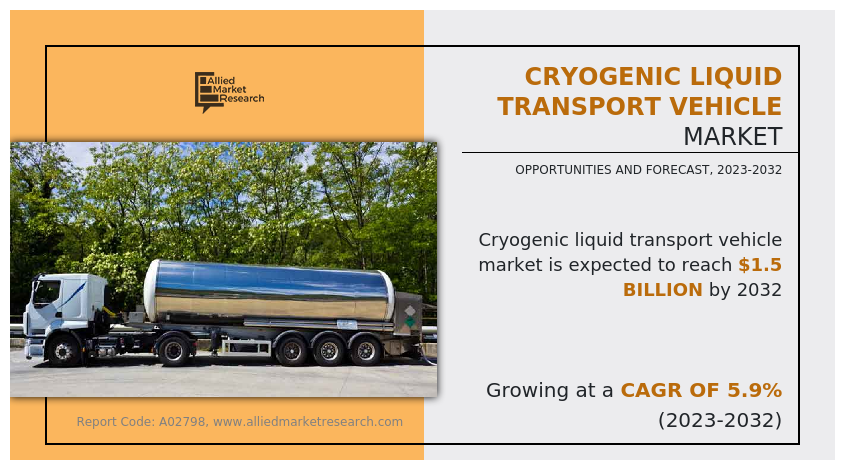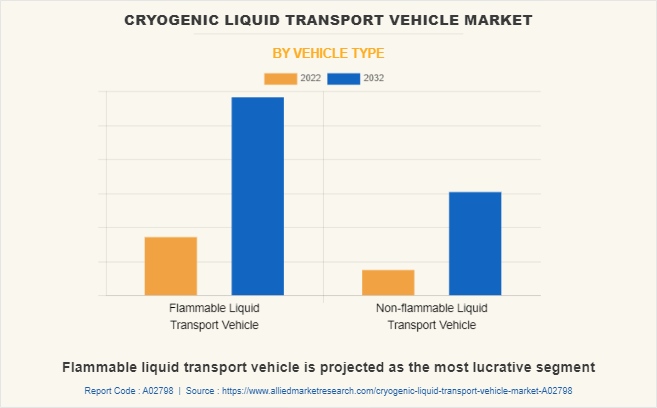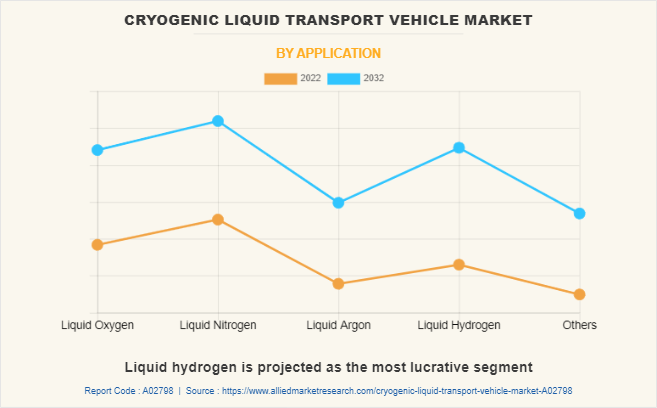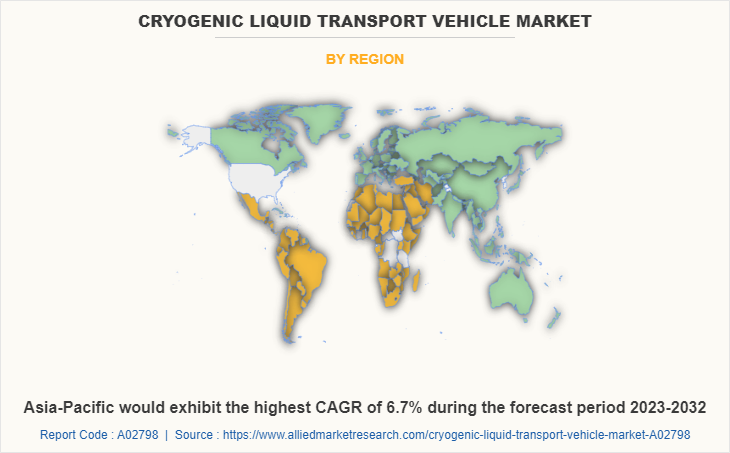Cryogenic Liquid Transport Vehicle Market Insights, 2032
The global cryogenic liquid transport vehicle market size was valued at $0.8 billion in 2022, and is projected to reach $1.5 billion by 2032, growing at a CAGR of 5.9% from 2023 to 2032.
Cryogenic liquid transport vehicles are specialized vehicles used for transportation of cryogenic liquified gases. Cryogenic liquids are used in a wide range of industries such as automotive, electronics, food, marine, healthcare, pharmaceutical, and aerospace, among others. These vehicles include cryogenic trailers and tankers with capabilities to maintain stability of fluids in their liquid state. Liquifying gases into their cryogenic form allows for easier and cheaper forms of transportation. Gases such as helium, argon, oxygen, and nitrogen among others require a large surface area in their gaseous state. Cryotechnology enables these gases to be liquified and compacted to be transported longer distances.

Cryogenic liquid transport vehicles are used for transportation and delivery of cryogenic liquids when high-volume transport is needed in the absence of pipelines. For instance, liquification of hydrogen requires cooling to cryogenic temperatures through a liquefaction process. For longer distances, hydrogen is transported as a liquid in super-insulated cryogenic tanker trucks.
After liquefaction, the liquid hydrogen is dispensed to delivery trucks and transported to distribution sites, where it is vaporized to a high-pressure gaseous product for dispensing. Trucking liquid hydrogen over long distances is considered more economical than trucking gaseous hydrogen owing to its ability to hold a much larger mass of hydrogen than a gaseous tube trailer. Increase in demand for cryogenic gases from diverse industries, rise in demand for LNG, and increase in adoption of clean energy sources are the major factors that propel the market growth. However, high costs associated with cryogenic liquid transport vehicles hamper the growth of the market. Furthermore, technological advancement and greater demand from developing countries are the factors expected to offer growth opportunities during the forecast period.
The cryogenic liquid transport vehicle market is segmented into vehicle type, application, and region. By vehicle type, it is segmented into non-flammable liquid transport vehicles and flammable liquid transport vehicles. By application, it is classified into liquid oxygen, liquid nitrogen, liquid argon, liquid hydrogen, and others. By region, the market is analyzed across North America, Europe, Asia-Pacific, and LAMEA.
Liquid nitrogen is used in the food processing industry to freeze and preserve food products. The freezing of bakery products, meat, poultry, fish, prepared meals, vegetables, and fruits are major places where liquid nitrogen is used for the food industry. The rising disposable income has resulted in the increasing demand for packaged food and beverages across various regions. Thus, the expanding food and beverage industry is anticipated to surge the demand for liquid nitrogen during the forecast period, boosting the demand for cryogenic liquid transport vehicles.
Owing to its non-toxic, odorless, colorless, chemically inert, and inflammable properties, it is widely used in the chemical and pharmaceutical industry. The growing demand for liquid nitrogen in a variety of industries, including aerospace, healthcare, and manufacturing, is expected to accelerate the need for cryogenic liquid transport vehicles to transport these cryogenic liquids safely and efficiently.
The Asia-Pacific cryogenic liquid transport vehicle market is expanding due to increase in¯demand for cryogenic liquids from the healthcare, automotive, and manufacturing industries, with China, and Japan leading the way. China is a prominent market for cryogenic liquid transport vehicles, due to its rapidly developing industrial sector and rise in need for cryogenic liquids such as liquid hydrogen, liquid oxygen and liquefied natural gas. The country's large manufacturing capacity in automotive industry and country’s export capacity has resulted in increased exports of cryogenic liquid transport vehicles to other countries. Moreover, CIMC Enric and Zhangjiagang Furui Special Equipment Co., Ltd., are among the key participants in the Chinese market. These companies also export cryogenic trailers to African countries to increase their cryogenic liquid transport vehicle market share.

For instance, in June 2022, Furui CIT, a subsidiary of Zhangjiagang Furui Special Equipment Co., Ltd., delivered the first batch of 100 LNG semi-trailers to Nigerian customers. Due to the rather primitive local natural gas pipeline infrastructure, the trailers are employed as virtual pipes to transfer LNG from liquid facilities to gasification stations. The government has enacted regulations to support the development of cleaner energy vehicles. This further supports adoption of hydrogen and LNG based vehicles resulting in increased demand for refuel stations and cryogenic liquid fuel transportation.
Some leading companies profiled in the cryogenic liquid transport vehicles industry report comprise Chart Industries, Cryogenmash, FIBA Technologies, Inc., Shijiazhuang Enric Gas Equipment Co., Ltd., Karbonsan Pressure Vessel & Trading Co., Cryolor, Wessington Cryogenics, Eurotank GmbH, Cryogas Equipment Private Limited, and Zhangjiagang Furui CIT Co., Ltd. The prominent companies operating in the market are adopting strategies such as product launch, contracts, and expansion to strengthen their market position.
In January 2022, Cryolor in partnership with Cryogenic Industrial Solutions, delivered the first five of seven liquid hydrogen trailers to major industrial gas company Air Liquide and its U.S. subsidiary Airgas. The first three trailers (Jumbo) have a maximum payload of 17,990 U.S. gallons, and the remainder of the trailers have 'B' Train single axle. In June 2022, Zhangjiagang Furui CIT Co., Ltd. developed and shipped the first batch of 100 LNG semi-trailers to Nigerian customers at the port authority wharf. Nigerian customers use LNG transport semi-trailers as virtual pipelines to transport LNG from the liquid plant to the downstream gasification station & supply it to end users after re-gasification.
Increase in demand for cryogenic gases from diverse industries
The cryogenic liquid transport vehicle industry has grown in recent years owing to increased demand for cryogenic liquids from various industries such as healthcare, food industry, manufacturing industry. The rise of the healthcare business is one of the main drivers of this growth. Liquid nitrogen and liquid oxygen are common cryogenic liquids used in medical and pharmaceutical applications. They serve in cryosurgery, freezing and storing biological samples, and transporting vaccinations among other applications.
Moreover, during COVID-19, majority of the hospitals were facing liquid oxygen shortage, thereby driving the demand for cryogenic liquid tankers. For instance, in April 2021, 450 metric tons of liquid oxygen was supplied to Maharashtra, Uttar Pradesh, and Delhi through six Oxygen Express trains from the Jindal Steel and Power Ltd. (JSPL) steel mill in India. The further distribution of liquid oxygen was carried out by cryogenic liquid transport vehicles. As the healthcare industry expands, so will the demand for cryogenic liquids, thereby fueling the cryogenic liquid transport vehicle market.
The food industry is another industry generating demand for cryogenic liquid transport vehicles. Cryogenic liquids are used to freeze and transport food products, as well as to make ice cream and frozen veggies. With rise in demand for frozen and convenience meals, the need for cryogenic liquids is predicted to rise, propelling the cryogenic liquid transport vehicle market forward. In addition, the rise in industrial gas demand is propelling the market of cryogenic liquid transport vehicles. Nitrogen, oxygen, and argon are cryogenic liquids that are utilized in a variety of industrial applications such as welding, metal production, and electronics manufacturing. The demand for cryogenic liquid transport vehicles is projected to rise as the demand for these industrial gases rises.

Rise in demand for Liquefied Natural Gas (LNG)
The rise in demand for LNG is another driver of the cryogenic liquid transport vehicle market. LNG is a clean-burning fuel that is increasingly being used as an alternative to diesel in heavy-duty vehicles, marine vessels, and power generation. As the world transitions toward cleaner and more sustainable energy sources, the demand for LNG is expected to continue to grow.
From 2020 to 2021, global LNG commerce increased by 4.5%, hitting an all-time high of 372.3 MT. A significant post-pandemic recovery has resulted in an increase in LNG imports, even though the annual growth rate of 4.5% remains well below the 13.0% pre-COVID-19 level in 2019.
Recent improvements in the LNG industry have increased the demand for cryogenic liquid transport vehicles. The increase in LNG exports has been one of the most significant trends. Countries such as the U.S., Australia, and Qatar have made significant investments in LNG production and are now selling LNG to countries across the world. As a result, dedicated cryogenic liquid transport trucks are required to transport LNG from manufacturing sites to export ports.
The emergence of small-scale LNG is another recent development in the LNG industry. Small-scale LNG production and distribution includes the production and distribution of LNG in smaller volumes, often to service regional or local markets. This has resulted in a demand for smaller, more adaptable cryogenic liquid transport vehicles capable of delivering LNG to remote locations or consumers with restricted access to pipeline infrastructure. Therefore, rise in LNG demand is propelling the cryogenic liquid transport vehicle industry forward. Manufacturers are creating new and more advanced cryogenic liquid transport vehicles to fulfil the needs of this growing market, as demand for LNG exports and small-scale LNG grows.
Technological advancement
The market for cryogenic liquid transport vehicles offers numerous prospects for technological developments that can improve these vehicles' efficiency, safety, and reliability. These improvements have the potential to open new markets and applications for cryogenic liquids, hence increasing demand for cryogenic liquid transport vehicles. The development of new insulating systems that can better maintain low temperatures and reduce cryogenic liquid loss during transport is one such potential. Improved insulation systems can help to minimize the amount of energy needed to keep the cryogenic liquid at the proper temperature, resulting in lower running costs and higher efficiency.
Moreover, the incorporation of sensors and monitoring systems are capable of providing real-time data on the temperature, pressure, and other parameters within the cryogenic tank. This information can be utilized to optimize the vehicle's functioning and ensure that the cryogenic liquid is carried safely and effectively. Therefore, the cryogenic liquid transport vehicle industry offers numerous prospects for technological developments that can improve these vehicles' performance, safety, and reliability.

The cryogenic liquid transport vehicle market is segmented into Vehicle Type and Application.
Key Benefits For Stakeholders
- This report provides a quantitative analysis of the market segments, current trends, estimations, and dynamics of the cryogenic liquid transport vehicle market analysis from 2022 to 2032 to identify the prevailing cryogenic liquid transport vehicle market opportunities.
- The market research is offered along with information related to key drivers, restraints, and opportunities.
- Porter's five forces analysis highlights the potency of buyers and suppliers to enable stakeholders make profit-oriented business decisions and strengthen their supplier-buyer network.
- In-depth analysis of the cryogenic liquid transport vehicle market segmentation assists to determine the prevailing market opportunities.
- Major countries in each region are mapped according to their revenue contribution to the global market.
- Market player positioning facilitates benchmarking and provides a clear understanding of the present position of the market players.
- The report includes the analysis of the regional as well as global cryogenic liquid transport vehicle market trends, key players, market segments, application areas, and market growth strategies.
Cryogenic Liquid Transport Vehicle Market Report Highlights
| Aspects | Details |
| Market Size By 2032 | USD 1.5 billion |
| Growth Rate | CAGR of 5.9% |
| Forecast period | 2022 - 2032 |
| Report Pages | 201 |
| By Vehicle Type |
|
| By Application |
|
| By Region |
|
| Key Market Players | Karbonsan Pressure Vessel & Trading Co., Wessington Cryogenics, Zhangjiagang Furui CIT Co., Ltd., FIBA Technologies, Inc., Cryolor, Cryogenmash, Eurotank GmbH, Cryogas Equipment Private Limited, Chart Industries, Shijiazhuang Enric Gas Equipment Co., Ltd. |
Analyst Review
The demand for cryogenic liquid transport vehicles is increasing from sectors such as healthcare, biotechnology, and automotive. Also, substantial rise in related industries such as aerospace, chemical manufacturing, food and beverages, and energy & power drives the growth of the cryogenic liquid transport vehicle market. Investments in the energy sector have grown considerably in the past years, creating an increased demand for cryogenic liquids. In addition, the economies such as the U.S., China, and India, are investing heavily on space exploration activities, thereby supporting the growth of the market.
This is particularly due to several ambitious space programs that have been lined up in the next few years including ISRO’s Chandrayaan-3 and the Gaganyaan mission in 2021, Japanese agency JAXA’s mission to send its rover to the lunar surface in 2021, and similar projects from many other space agencies that are expected to attract huge investments into the space launch industry, thereby driving the industry. The market for cryogenic liquid transport vehicles is witnessing growth with the increased demand for cleaner energy sources. Moreover, energy sources such as liquid hydrogen and LNG is gaining popularity as an alternative for electricity generation and fuel for heavy vehicles, driving the demand for cryogenic liquid transport vehicles.
The global cryogenic liquid transport vehicle market was valued at $0.8 billion in 2022, and is projected to reach $1.5 billion by 2032, registering a CAGR of 5.9% from 2023 to 2032.
Some leading companies in the market include Chart Industries, Cryogenmash, FIBA Technologies, Inc., Shijiazhuang Enric Gas Equipment Co., Ltd., Karbonsan Pressure Vessel & Trading Co., Cryolor, Wessington Cryogenics, Eurotank GmbH, Cryogas Equipment Private Limited, and Zhangjiagang Furui CIT Co., Ltd.
The leading application of cryogenic liquid transport vehicles is liquid nitrogen.
The largest regional market for cryogenic liquid transport vehicles is Asia-Pacific.
The upcoming trends in the cryogenic liquid transport vehicle market include increase in demand for cryogenic gases from diverse industries and rise in adoption of clean energy sources across the world.
Loading Table Of Content...
Loading Research Methodology...


